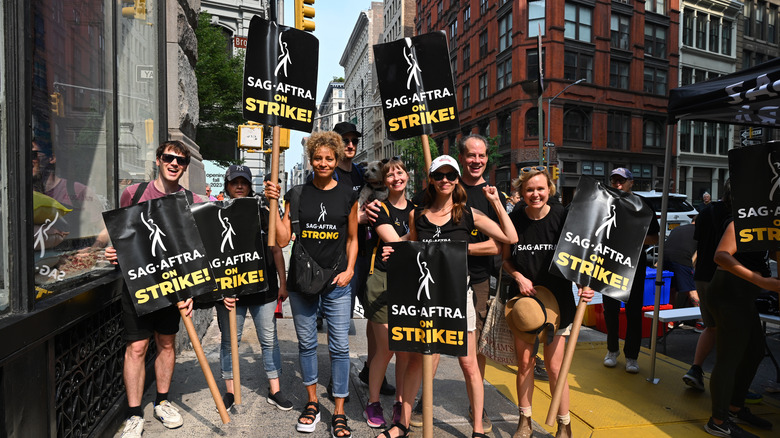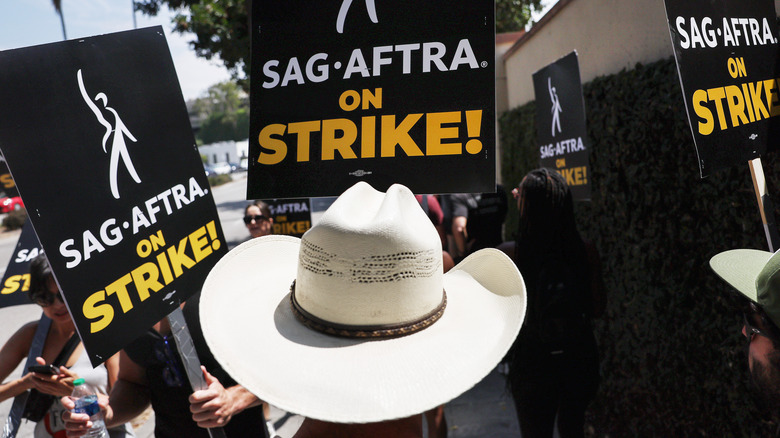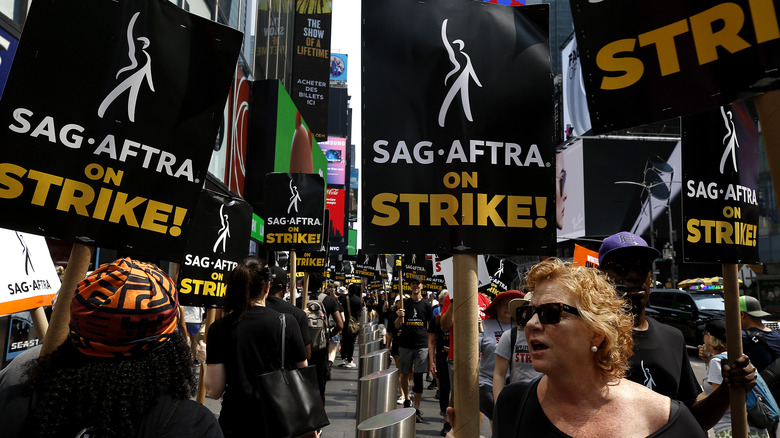The Real Reason You Won't See UK Actors & Writers Striking With Hollywood
On July 14, 2023, the Screen Actors Guild took a stand alongside the Writers Guild of America and went on strike — but you won't see any of their contemporaries in the United Kingdom joining them thanks to some seriously restrictive union laws.
According to a piece in The Hollywood Reporter, the U.K. actor's union, known as Equity, cannot fully strike with SAG-AFTRA, though they did release a statement on July 14 regarding the strike (also reported in THR). "Equity stands full square behind our sister union in their claim and the action their board have agreed to take," said the organization's general secretary Paul W. Fleming. "Equity too is experiencing bullish engagers attempting to undermine its collectively bargained agreements. SAG-AFTRA has our total solidarity in this fight."
That said, Fleming also described the U.K.'s labor laws as "draconian," so sympathy strikes are probably out of the question as they could end up breaking the law. Danielle Parsons, an employment lawyer at a prominent U.K. firm, told THR, "Equity cannot simply call a strike in sympathy with SAG-AFTRA members in the U.S., as this would likely be classed as 'secondary action,' which is unlawful in the U.K."
Russell T. Davies spoke out about his inability to strike
"Doctor Who" and "It's a Sin" showrunner Russell T. Davis, who brought U.K. writers together for a rally to show support for their American brethren, told THR that despite being allied with one guild, he can't actively support the other.
"I'm a member of the Writers' Guild of Great Britain, I'm not a member of the Writers Guild of America," Davies told the outlet. "It is literally illegal for me to go on strike." It's not just writers and actors, to make it even worse; as Davis subsequently pointed out, "I would be on strike for our nurses and for our teachers, but I am literally not allowed to."
The specifics surrounding the U.K.'s union laws aren't particularly easy to understand, but Parsons provided THR with slightly more context when it comes to this issue. Not only did she say that actors are required to work in the U.K. to avoid breaking any of their contracts, but she said that "workers may be subject to disciplinary action, including dismissal and/or a claim for breach of contract." Beyond that, Parsons said anyone who tries to strike could be "subject to extensive trade union legislation. And any strike which isn't compliant with this is likely to be unlawful."
Why is SAG-AFTRA striking?
So why is the Screen Actors Guild striking alongside the Writers Guild of America in the first place? Well, in May of this year, the WGA failed to reach an agreement with the Alliance of Motion Picture and Television Producers over a whole host of issues, and they went on strike; a few months later, facing similar issues and deciding to stand with the writers who make their jobs possible, SAG-AFTRA joined them on the picket line. One issue the two share is that of artificial intelligence, a technology that could be manipulated by executives to cut costs, like in a practice where they could scan a background actor's likeness and use it in perpetuity despite only paying the performer for a single day of work.
SAG-AFTRA president Fran Drescher made the announcement on Thursday, July 13 alongside her chief negotiator Duncan Crabtree-Ireland, and she was appropriately fired up, to say the least. After confirming that SAG-AFTRA was hitting a breaking point as the WGA also did, Drescher referenced one of the world's most famous revolutions against the wealthy, powerful elite: "Drescher said, "Eventually, the people break down the gates of Versailles. And then it's over. We're at that moment right now."
This piece was written during the 2023 WGA and SAG-AFTRA strikes. To learn more about why writers and actors are currently on strike, click here for an up-to-date explainer from our Looper team.


